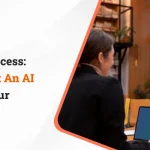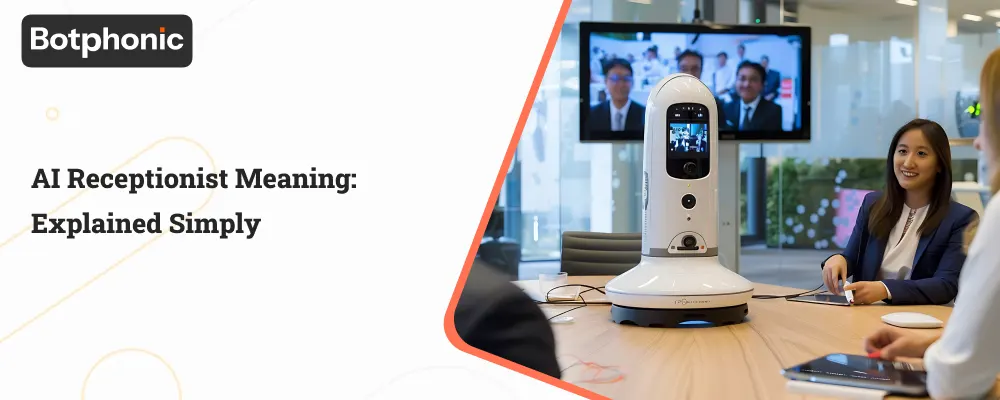
Summarize Content With:
Summary
In this blog, we will be covering the topic of AI receptionists, or receptionists augmented by technology and artificial intelligence, how they function, the appeal for companies, and many advantages over a standard receptionist. Also covered will be artificial intelligence phone receptionists, AI call assistants and the impact of such technological innovations on customer service.
Key Takeaways
- The AI receptionist is justifiably the first thing to come to mind when defining the term “AI call assistant.” An AI-powered digital system that performs a human-like task of answering calls and/or customer queries is what is meant by this.
- AI call assistants, along with AI phone receptionists, are resources that companies employ to achieve the dual objectives of reducing time and costs while maintaining constant availability, i.e., 24/7.
- One of the significant advantages that AI receptionists can bring to customer satisfaction is their ability to reduce customer waiting time and handle multiple calls simultaneously.
- Utilising an AI receptionist is just automation on another level; it’s about businesses getting the benefit of scalability and professionalism.
Introduction
Just picture arriving at a place where you are always greeted with a big smile, and you feel immediately at home without having to wait around. But that’s the contribution of the AI receptionist. In layman’s terms, an AI receptionist is a virtual receptionist that can handle all the usual front-desk tasks. Like greeting visitors, scheduling appointments, and answering questions, but more rapidly and accurately than the front-desk workers, of which many have sadly become, in this century.
Perhaps it is having a friendly assistant that is always there, who makes every communication personal and painless. In this blog we will break down exactly what an AI receptionist is and how it is a key part of the future of smarter, smoother customer experiences.
What Does an AI Receptionist Mean?
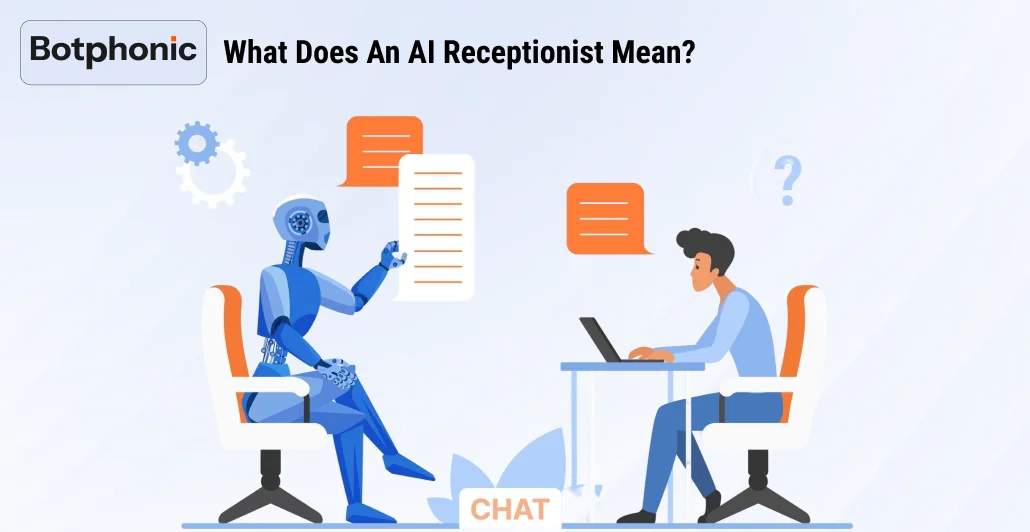
The essence of the AI receptionist’s meaning is effortless. An AI receptionist is an artificial intelligence-powered software that can answer customer calls, schedule appointments, provide information, and even resolve fundamental issues. Unlike a human receptionist, an AI phone receptionist can work 24/7, tirelessly, and without human error.
An AI call assistant is an intelligent virtual companion that can listen, comprehend, and respond like a human, but a lot faster and more efficiently.
The report by Gartner states that 2026 will see a substantial increase in the extent of conversational AI automation in the area of customer service, wherein around 10% of agent-customer interactions in contact centers will be automated, a significant increase from the present automated rate of 1.6%.
How Does an AI Receptionist Work?
It is easier to grasp the concept of an “AI receptionist” when the workings of the process are known. On the technical side, an AI receptionist is a device that is powered by natural language processing (NLP) and machine learning.
These technologies equip the AI with the capability of recognizing spoken or written words, inferring the intent, and forthwith reacting in a normal and human-like manner.
For Example:
- A customer calls in to ask about the working hours of a business. An AI phone operator gives the answer right away with the exact information.
- Someone wants to schedule an appointment. The AI assistant by call can certainly find an open time and confirm the appointment within a few moments.
- In the case of a problematic issue, the AI receptionist, without a problem, passes the call to the correct human customer support representative.
Why Businesses Are Switching to AI Receptionists
The transformation to AI-powered phone receptionists is not merely a matter of keeping up with technological trends; it’s about addressing genuine business challenges. A full-time human receptionist carries a high cost, and he can only take one call at a time. An AI receptionist, on the other hand, can manage hundreds of calls simultaneously, operate at all hours of the day, and never tire.
Benefits include:
- Cost Savings: No salary, benefits or overtime pay.
- Scalability: Scale up to large call volumes without increasing your staff.
- Consistency: Professional response to each caller every time.
- Availability: AI call assistants don’t need breaks, weekends or sick days.
Difference Between Human Receptionist and AI Receptionist
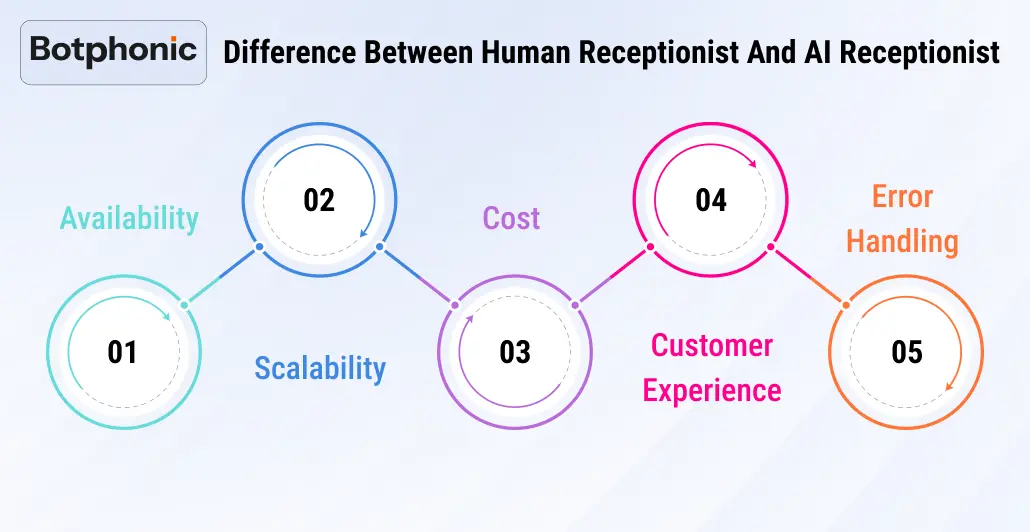
The traditional front desk employee was a human receptionist that greeted clients, answered the telephone scheduled appointments, and generally offered the “human” side of customer service. They achieve this by means of empathizing, exercising emotional intuition and responding to spontaneous or sensitive situations.
Conversely, an AI receptionist is a virtual system that possesses artificial intelligence.
It is not a person who is making the phone call, creating the appointment, transferring the call to the correct department, or even VIEWING the information- it is software. These AI interfaces are, unlike humans, available 24/7, are never fatigued and can field several calls simultaneously.
Key Differences:
Availability
- Human Receptionist: 40 hours/week, with time off for lunch/breaks, sick days and holidays.
- AI Receptionist: Answers calls 24/7 including weekends and holidays.
Scalability
- Human Receptionist: Handles one call/visitor at a time.
- AI Receptionist : it can handle hundreds of calls at the same time with no lag.
Cost
- Human Receptionist: Requires a salary, benefits, training, and in some cases overtime.
- AI Receptionist: Usually a monthly subscription fee with no continual HR costs.
Customer Experience
- Human Receptionist: Empathetic, warm, and humane contact.
- AI Receptionist: reliable, precise, instant, and emotionless; do you see?
Error Handling
- Human Receptionist: Subject to error based on human fatigue or distraction.
- AI Receptionist: High accuracy but easily confused if the caller uses ambiguous or complex language.
Real Applications of AI Customer Service Representatives
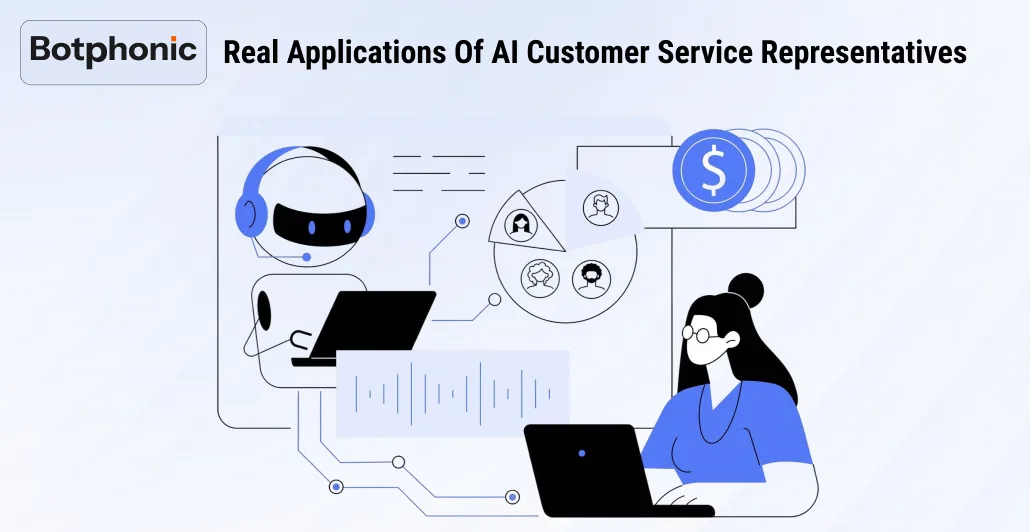
Companies in almost every industry are using AI phone receptionists and AI call assistant. Some examples include:
- Medical: Appointment, Reminder and FAQ assistance.
- Legal Services: Answering client calls, transferring them to the correct attorney, and obtaining initial facts of the case.
- Hospitality: reservation booking, check-in/check-out information and customer inquiries
- Small Businesses: Providing a professional call experience even if they don’t have the budget for a full-time receptionist.
Learn how an AI receptionist can save you time, reduce costs, and be available round the clock without missing a single opportunity.
Try Botphonic AI Now!Future of AI Receptionists
AI receptionists are here to stay, and their future looks bright. With AI-powered phone receptionists and advancements in voice recognition, machine learning, and natural language processing, they will only become smarter. Soon, they could sense callers emotions, adapt responses in real time, and connect to more business systems.
As businesses continue to digitise, artificial intelligence call assistants will transition from optional to critical business assets.
Conclusion
“AI receptionist” is a concept that is easy to understand the first time: it is an intelligent, automated assistant that does the same tasks as a human receptionist but with less effort and more availability. Absolutely. No wonder that more and more companies are adopting AI call assistants and AI phone receptionists as tools in their save-the-time, reduce-the-cost, and improve-the-service strategies.
If you are starting to think about having AI receptionists in your business, the time is already past; you should have them by now. The tech is there, and the pros are clear – customer delight, cost reduction and long-hour professional service.

